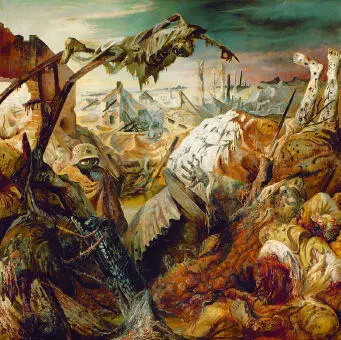Painters too have lost interest in generals on horses and in tactical manoeuvres. Instead, they strive to depict how the common soldier feels. Look again at The Battle of Breitenfeld and The Battle of White Mountain . Now look at the following two pictures, considered masterpieces of twentieth-century war art: The War ( Der Krieg ) by Otto Dix, and That 2,000 Yard Stare by Tom Lea.
Dix served as a sergeant in the German army during the First World War. Lea covered the Battle of Peleliu Island in 1944 for Life magazine. Whereas Walter and Snayers viewed war as a military and political phenomenon, and wanted us to know what happened in particular battles, Dix and Lea view war as an emotional phenomenon, and want us to know how it feels. They don’t care about the genius of generals or about the tactical details of this or that battle. Dix’s soldier might be in Verdun or Ypres or the Somme – it doesn’t matter which, because war is hell everywhere. Lea’s soldier just happens to be an American GI in Peleliu, but you could see exactly the same 2,000-yard stare on the face of a Japanese soldier in Iwo Jima, a German soldier in Stalingrad or a British soldier in Dunkirk.

Otto Dix, The War (1929–32).
Staatliche Kunstsammlungen, Neue Meister, Dresden, Germany © Lessing Images.

Tom Lea, That 2,000 Yard Stare (1944).
Tom Lea, That 2,000 Yard Stare , 1944. Oil on canvas, 36"x28". LIFE Collection of Art WWII, U.S. Army Center of Military History, Ft. Belvoir, Virginia. © Courtesy of the Tom Lea Institute, El Paso, Texas.
In the paintings of Dix and Lea, the meaning of war does not emanate from tactical movements or divine proclamations. If you want to understand war, don’t look up at the general on the hilltop, or at angels in the sky. Instead, look straight into the eyes of the common soldiers. In Lea’s painting, the gaping eyes of a traumatised soldier open a window onto the terrible truth of war. In Dix’s painting, the truth is so unbearable that it must be partly concealed behind a gas mask. No angels fly above the battlefield – only a rotting corpse, hanging from a ruined rafter and pointing an accusing finger.
Artists such as Dix and Lea thus overturned the traditional hierarchy of war. In earlier times wars could have been as horrific as in the twentieth century. However, even atrocious experiences were placed within a wider context that gave them positive meaning. War might be hell, but it was also the gateway to heaven. A Catholic soldier fighting at the Battle of White Mountain could say to himself: ‘True, I am suffering. But the Pope and the emperor say that we are fighting for a good cause, so my suffering is meaningful.’ Otto Dix employed an opposite kind of logic. He saw personal experience as the source of all meaning, hence his line of thinking said: ‘I am suffering – and this is bad – hence the whole war is bad. And if the kaiser and the clergy nevertheless support the war, they must be mistaken.’ 7
The Humanist Schism
So far we have discussed humanism as if it were a single coherent world view. In fact, humanism shared the fate of every successful religion, such as Christianity and Buddhism. As it spread and evolved, it fragmented into several conflicting sects. All humanist sects believe that human experience is the supreme source of authority and meaning, yet they interpret human experience in different ways.
Humanism split into three main branches. The orthodox branch holds that each human being is a unique individual possessing a distinctive inner voice and a never-to-be-repeated string of experiences. Every human being is a singular ray of light, which illuminates the world from a different perspective, and which adds colour, depth and meaning to the universe. Hence we ought to give as much freedom as possible to every individual to experience the world, follow his or her inner voice and express his or her inner truth. Whether in politics, economics or art, individual free will should have far more weight than state interests or religious doctrines. The more liberty individuals enjoy, the more beautiful, rich and meaningful is the world. Due to this emphasis on liberty, the orthodox branch of humanism is known as ‘liberal humanism’ or simply as ‘liberalism’. *
It is liberal politics that believes the voter knows best. Liberal art holds that beauty is in the eye of the beholder. Liberal economics maintains that the customer is always right. Liberal ethics advises us that if it feels good, we should go ahead and do it. Liberal education teaches us to think for ourselves, because we will find all the answers within us.
During the nineteenth and twentieth centuries, as humanism gained increasing social credibility and political power, it sprouted two very different offshoots: socialist humanism, which encompassed a plethora of socialist and communist movements, and evolutionary humanism, whose most famous advocates were the Nazis. Both offshoots agreed with liberalism that human experience is the ultimate source of meaning and authority. Neither believed in any transcendental power or divine law book. If, for example, you asked Karl Marx what was wrong with ten-year-olds working twelve-hour shifts in smoky factories, he would have answered that it made the kids feel bad. We should avoid exploitation, oppression and inequality not because God said so, but because they make people miserable.
However, both socialists and evolutionary humanists pointed out that the liberal understanding of the human experience is flawed. Liberals think the human experience is an individual phenomenon. But there are many individuals in the world, and they often feel different things and have contradictory desires. If all authority and meaning flows from individual experiences, how do you settle contradictions between different such experiences?
On 17 July 2015 the German chancellor Angela Merkel was confronted by a teenage Palestinian refugee girl from Lebanon, whose family sought asylum in Germany but faced imminent deportation. The girl, Reem, told Merkel in fluent German that ‘It’s really very hard to watch how other people can enjoy life and you yourself can’t. I don’t know what my future will bring.’ Merkel replied that ‘politics can be tough’ and explained that there are hundreds of thousands of Palestinian refugees in Lebanon, and Germany cannot absorb them all. Stunned by this no-nonsense reply, Reem burst out crying. Merkel proceeded to stroke the desperate girl on the back, but stuck to her guns.
In the ensuing public storm, many accused Merkel of cold-hearted insensitivity. To assuage criticism, Merkel changed tack, and Reem and her family were given asylum. In the following months, Merkel opened the door even wider, welcoming hundreds of thousands of refugees to Germany. But you can’t please everybody. Soon enough she was under heavy attack for succumbing to sentimentalism and for not taking a sufficiently firm stand. Numerous German parents feared that Merkel’s U-turn means their children will have a lower standard of living, and perhaps suffer from a tidal wave of Islamisation. Why should they risk their families’ peace and prosperity for complete strangers who might not even believe in the values of liberalism? Everyone feels very strongly about this matter. How to settle the contradictions between the feelings of the desperate refugees and of the anxious Germans? 8
Liberals forever agonise about such contradictions. The best efforts of Locke, Jefferson, Mill and their colleagues have failed to provide us with a fast and easy solution to such conundrums. Holding democratic elections won’t help, because then the question will be who would get to vote in these elections – only German citizens, or also millions of Asians and Africans who want to immigrate to Germany? Why privilege the feelings of one group over another? Likewise, you cannot resolve the Arab–Israeli conflict by making 8 million Israeli citizens and 350 million citizens of Arab League nations vote on it. For obvious reasons, the Israelis won’t feel committed to the outcome of such a plebiscite.
Читать дальше
Конец ознакомительного отрывка
Купить книгу














